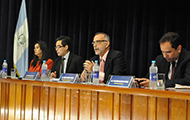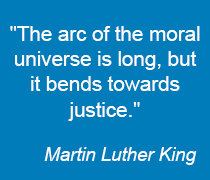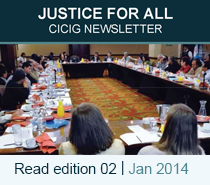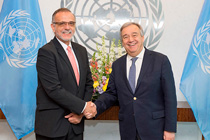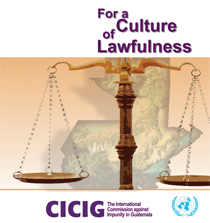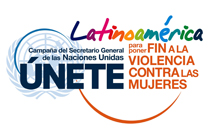For the purposes of providing visitors to our site with a better understanding of CICIG, here are the answers to the most commonly asked questions regarding CICIG's role and mandate in Guatemala:
1. What is CICIG?
CICIG is the International Commission against Impunity in Guatemala. The Government of Guatemala asked that the United Nations create CICIG as part of efforts to eradicate illegal groups and clandestine security structures that operate in Guatemala.
2. Why was CICIG created?
In the 1994 Comprehensive Agreement on Human Rights, the Government of Guatemala pledged to "fight any signs" of "illegal security groups" and "clandestine security structures". However, the United Nations Verification Mission in Guatemala (MINUGUA), human rights organizations and the Human Rights Ombudsman continued to report the existence of such groups and linked them with violent crimes and threats made to human rights defenders and investigators working in the justice sector. Therefore, CICIG was created in accordance with the Agreement signed between United Nations (UN) and the Government of Guatemala on December 12, 2006.
3. When did the Commission begin to operate?
The Agreement between the UN and the Government of Guatemala was ratified by the Congress of the Republic on August 1, 2007, and it entered into force on September 4, 2007.
4. Mandate (Article 1); roles (Article 2); and powers (Article 3) of CICIG.
5. What does CICIG's role as a complementary prosecutor entail?
In accordance with the laws of Guatemala, CICIG can carry out criminal prosecutions or join prosecutions begun by the Public Prosecutor's Office (MP) in cases related to crimes allegedly committed by members of criminal structures that fall under the Commission's mandate. This makes it possible for CICIG to cooperate with the MP in such cases and support the fact-finding process. CICIG can also request the performance and approval of investigative actions, pursuant to Guatemalan law.
6. Is CICIG independent?
Yes—politically, organizationally and financially.
7. Where does funding come from for CICIG?
The associated costs are funded through voluntary contributions made by different countries. As a result, a trust fund was created, which is administered by the United Nations Programme for Development (UNDP).
8. Does the Government of Guatemala or its citizens provide any financial support to CICIG?
No. CICIG depends exclusively upon voluntary contributions made by the international community in order to operate. This guarantees the independence of the Commission.
9. Under the authority of which organization is CICIG?
The United Nations (UN), which has its headquarters in New York City. CICIG is also directly answerable to the Department of Political Affairs, to whom it reports all the activities it carries out.
10. Does CICIG conform to Guatemalan laws?
Yes. According to the Agreement signed between the United Nations and the Government of Guatemala, the Commission will undertake its activities pursuant to Guatemalan legislation and as regulated by the aforementioned Agreement.
11. Does CICIG have the power to rule on the cases its investigates?
The State of Guatemala is responsible for proceedings and rulings related to the cases investigated by the Commission.
12. Does CICIG conduct searches of premises?
No. The Commission is responsible for accompanying Guatemalan authorities during searches of housing or properties.
13. Does CICIG issue national arrest warrants?
No. The Guatemalan courts of justice are responsible for issuing such arrest warrants.
14. Does CICIG issue international arrest warrants?
No. The Guatemalan courts of justice are responsible for issuing such arrest warrants. The National Civil Police (PNC) is responsible for coordinating with international police forces in order to arrest an accused party that is out of the country.
15. Until when will CICIG continue to operate in Guatemala?
CICIG will continue to work to help Guatemala disband illegal groups and clandestine security structures up until September 4, 2013. The extension of its third mandate was approved on December 20, 2010 by the United Nations General Assembly.
16. What is FECI?
The Special Unit of the Prosecutor's Office to Support CICIG (FECI) was created in order to investigate cases selected and assigned by CICIG and the MP, in accordance with the competency framework. The cases handled by FECI are selected based upon considerations of whether or not they meet the requirements set forth in the mandate conferred upon CICIG, and upon agreement between the Attorney General of the Republic and the Commissioner against impunity in Guatemala.
17. Can CICIG stop violence and organized crime in Guatemala?
No. Such work requires the participation of all three branches of the State. The Commission provides assistance to the MP in its mandated investigations, which relies upon a Legislative Branch so as to provide the laws necessary to combat this scourge; an Executive Branch that provide sufficient resources; a technical police force that provides evidence; and a Judiciary (OJ) that appropriately administers justice.
18. Why does CICIG only oversee some and not all cases?
Because CICIG is not mandated to tackle all crimes committed in Guatemala but rather to support the State of Guatemala in dealing with clandestine structures and illegal security groups, which affect the rights of Guatemalans though their acts and can create impunity.
Furthermore, under no circumstances should CICIG replace the role of State institutions—especially the Public Prosecutor's Office (MP), which is constitutionally and legally responsible for carrying out public criminal prosecutions. It must also be considered that, as well as having a mandate restricted to clandestine structures and illegal security groups, CICIG is a temporary institution that has funding solely for the purposes of fulfilling its mandate.
19. Why does CICIG recommend the amendments to be made to Guatemalan legislation?
As the founding Agreement of CICIG stipulates, such work is part of its mandate: "Make recommendations to the State of Guatemala regarding public policies to be adopted—including the necessary judicial and institutional reforms—to eradicate and prevent the re-emergence of clandestine security structures and illegal security forces." In this regard, as part of institutional reforms, CICIG should make legal reform proposals.
20. What recommendations has CICIG made with regard to amending Guatemalan laws?
CICIG has present legislative reform packages, as well as supporting other similar initiatives. To find out more about this topic, click here.


